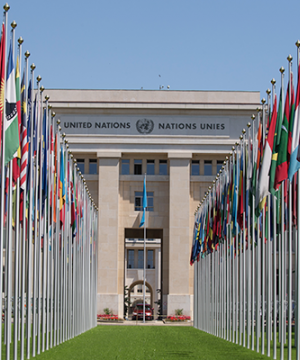Advancing Human Rights Around the World
Dec. 10 marks one such anniversary: the day in 1948 when the newly formed United Nations General Assembly adopted the Universal Declaration of Human Rights, setting a standard for the defense and protection of human rights across the globe. Now designated “Human Rights Day,” the world celebrates the anniversary of this declaration, but also, as Cleveland said, reflects on what more can be done.
Columbia Law School continues its long tradition of preparing the next generation of human rights advocates to be strategic, critical, and reflective. For more than half a century, the Law School has pioneered education and scholarship in human rights. Here, students have remarkable opportunities to immerse themselves in cutting-edge human rights research and practice through the Law School’s human rights curriculum, the Human Rights Institute (HRI), the Human Rights Clinic, Social Justice Initiatives (SJI), journals, and student-led organizations. Through human rights career advising, specialized human rights mentorship programs, summer fellowship funding, and post-graduate fellowships and other awards, the Law School provides extensive support to students and alumni pursuing careers in human rights.
Since the days of HRI’s founding by the late Louis Henkin—often credited with establishing human rights law in its modern form—Columbia Law School has been at the forefront of human rights scholarship and fieldwork. Cleveland and her HRI Co-Director Sarah Knuckey, the Lieff Cabraser Associate Clinical Professor of Law and director of the Human Rights Clinic, now spearhead the school’s efforts in these areas, backed by a team of leading advocates, educators, and scholars. A sample of recent Law School projects include:
The Human Rights Clinic’s work in Papua New Guinea to investigate allegations of human rights abuses and environmental degradation at one of the region’s largest gold mines.
Collaborations with civil society around the world to advance respect for international law in the context of lethal force and U.S. counterterrorism/military operations abroad, and to address pervasive secrecy and impunity.
The creation of a groundbreaking fact-finding report on dire living and working conditions at tea plantations throughout India.
Student advocacy for greater support for U.S. human rights initiatives before the United Nations Human Rights Committee in Geneva.
In closing her University Lecture, Cleveland invoked Robert F. Kennedy’s famous Day of Affirmation speech delivered at the University of Cape Town, South Africa, in 1966. “It is the challenge of our age, the age of connectivity, to harness and channel the tiny ripples of hope that emanate from our disparate human rights institutions to help build those ripples into a current capable of confronting the walls of oppression and resistance that daily challenge our world,” she said.
###
Posted December 9, 2016
